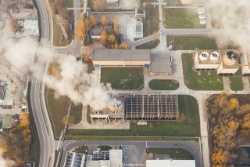Guidance to detect counterfeit/substandard materials
Guidance to detect counterfeit/substandard materials
13 June 2013
The Institution of
Professional Engineers (IPENZ) is updating its guidance for
engineers to safe guard against substandard and counterfeit
products.
IPENZ started reviewing its guidance to engineers after concerns were raised about the quality of materials and equipment used in various industries – construction, engineering and machinery – at its annual Engineering Professions Forum earlier this year.
The reviewed practice guidance are being distributed to about 14,000 IPENZ Members, associated Technical Interest Groups and Government over the next few days. It is publicly available at www.ipenz.org.nz
The website link is: http://www.ipenz.org.nz/ipenz/forms/pdfs/Counterfeit-Parts-and-Substandard-Materials.pdf
The updated guidelines promote practical steps and precautions to help engineers detect counterfeit materials and avoid using them. This includes taking precautionary measures such as verifying authentication, scrutinizing labels and packaging and checking for certification marks on products or materials they’ve ordered. In addition, there is advice to avoid products that lack identifying branding, or include additional markings other than from the original manufacturers, have poor-quality labels and out-of-date product codes.
“As counterfeiters become more sophisticated, counterfeit products become even more difficult to detect, creating an increasing need for additional scrutiny,” IPENZ chief executive Andrew Cleland said.
“Procurement through an unknown website at a price too good to be true should immediately raise concerns, but detection is not always that easy.”
These guidelines have been updated to assist engineers, but they include practical steps to safe-guard against inferior products, which could help anyone working with out-sourced products.
To date IPENZ has received only anecdotal evidence of sub-standard or counterfeit products in industry but any person including engineers with information on how such materials are arriving has a public duty to notify relevant authorities”, Dr Cleland said.
The Institution
will monitor the situation through any notifications
received from its members and associated industry sector
groups, working to assist industry
regulators.
ends


 Stats NZ: Greenhouse Gas Emissions Fall 2.0 Percent In The December 2024 Quarter
Stats NZ: Greenhouse Gas Emissions Fall 2.0 Percent In The December 2024 Quarter The Reserve Bank of New Zealand: Christian Hawkesby Appointed As Governor Of The RBNZ
The Reserve Bank of New Zealand: Christian Hawkesby Appointed As Governor Of The RBNZ Kiwi Economics: It’s Mayhem In Markets As Downside Risks Dominate Following Trump’s Tariffs
Kiwi Economics: It’s Mayhem In Markets As Downside Risks Dominate Following Trump’s Tariffs Mindful Money: Consumer Demand For Ethical Investing Remains Strong Despite International Headwinds
Mindful Money: Consumer Demand For Ethical Investing Remains Strong Despite International Headwinds Greenpeace: Taranaki - Greenpeace Activists Stop Unloading Of Palm Kernel Sourced From Indonesian Rainforests
Greenpeace: Taranaki - Greenpeace Activists Stop Unloading Of Palm Kernel Sourced From Indonesian Rainforests Seafood New Zealand: Seafood Situation Saved By A Sausage - New Plymouth Locals Innovate, Using Crayfish Bait
Seafood New Zealand: Seafood Situation Saved By A Sausage - New Plymouth Locals Innovate, Using Crayfish Bait



